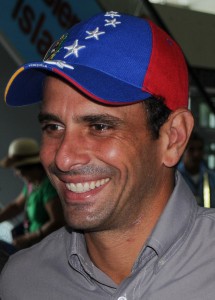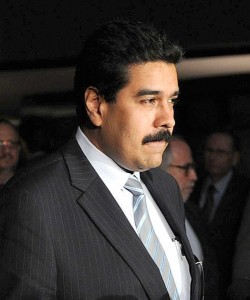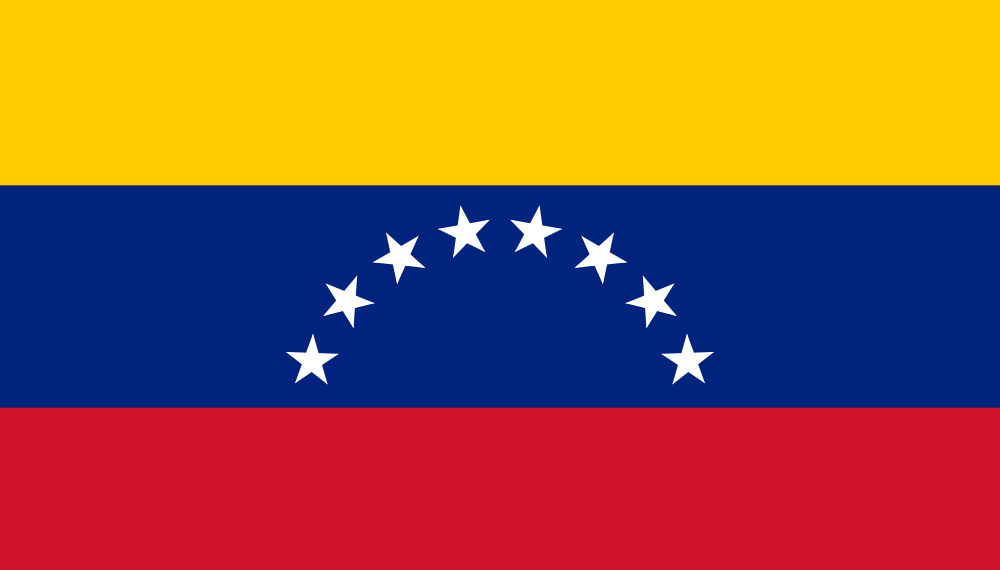by José Francisco Muci Lander
Four days after the announcement of President Hugo Chávez’s death on March 5, Tibisay Lucena, head of Venezuela’s electoral authority, called for new elections on April 14. On that day, the late Hugo Chávez’s political heir Nicolas Maduro will duke it out at the ballot box with opposition candidate Henrique Capriles Radonski. The ongoing ten-day campaign, the shortest in Venezuelan history, is unprecedented.

For the first time in fourteen years, the opposition is unified. Gone are the days when several parties independently endorsed one or more opposition candidates. The Democratic Unity Roundtable, comprised of all major opposition parties, has resolved its internal conflicts and is coordinating its efforts, activating the old mobilization mechanisms of the traditional Venezuelan parties to encourage voter turnout. For the first time in fourteen years, the government is going into elections that have historically been determined by state of the economy while suffering a significant economic hangover—a product of the dramatic increase in public spending before the presidential election on October 7, when Hugo Chávez defeated candidate Henrique Capriles by eleven percent of the vote.
As of today, all major pollsters in the country predict a Maduro win, and a big one, with a margin of ten to twenty percent of the popular vote. However, these predictions are not reliable because voter trends are moving too fast for the polls to accurately measure. Last Sunday, in his last campaign event for the capital city Caracas, Capriles claimed that an electoral victory would have been virtually impossible two weeks ago but that he is currently leading in the polls. (He was probably referring to an April 6 poll by Datamática that put Capriles up by five percentage points.)
In any case, this election will be about abstention. It will be about which party can get more of its supporters out to vote. An opposition victory is possible, if the opposition coalition achieves the more than the 6.5 million votes it received just seven months ago and if Chavismo suffers a significantly weaker turnout than in the presidential election on October 7, when 8.2 million came out to vote for Hugo Chávez himself.
Interim President Maduro’s campaign has focused on deifying Hugo Chávez and on convincing voters that he will continue his legacy—a wish that Chávez expressed in his final press conference. The government gave Chávez a weeklong funeral procession attended by heads of state from around the world, venerating him with titles like “Saint Hugo Chávez” and “Chávez, Christ of the Poor.” The regime has dominated the airwaves with reminders of how Chávez, unlike those presidents before him, put the ordinary people of Venezuela in the center of the political arena as the father of the Bolivarian Revolution and 21st Century Socialism. Maduro has called himself a son of Hugo Chávez, and in so doing he hopes to inherit Chávez’s popularity.
In spite of having months to prepare for the election, Maduro’s campaign has been poor. He lacks both the charisma of Hugo Chávez and his ability to relate to the ordinary people of Venezuela. His message, in his own words, is “radically Chavista,” and that seems to turn off soft Chavistas—voters who are not staunch supporters of the Revolution but had connected with Chávez on a personal level. Yet this message has been incoherent, improvised and often contradictory. His party, the United Socialist Party of Venezuela, announced that Chávez was going to be buried at three different locations on different days, and that he was and then wasn’t going to be embalmed.
Maduro has committed some egregious gaffes: he called the island of Margarita a state, which it is not, and he ascribed one state capital to the wrong state. Maduro also declared that an ancient curse was going to fall upon those who did not vote for him, that he felt the blessing of Chávez’s spirit through a bird in a small church, and that Chávez in heaven ultimately affected the selection of the first Latin American Pope. There is a general feeling, shared by the opposition and soft Chavistas, that these sorts of statements, and perhaps Maduro himself, are pavosos—liable to bring about bad luck. All in all, Maduro is simply not a politician of Chávez’s caliber—not even close. Since he was simply appointed to be both Chancellor of the Republic and later Vice President, Maduro has never won an election before.
Capriles, in contrast, has had a strong campaign. He has managed to revitalize his supporters who were let down after the October 7 electoral defeat, mobilizing them to what one newspaper called the largest protest since 1999. He has also tried to convince voters that he hopes to depolarize Venezuela’s highly divided and politicized society. There is little consensus about whether or not the opposition can exceed its record turnout of the October 7 election, but the number of votes Chavismo obtains will definitely fall.

Capriles has continued to reach undecided voters with his conciliatory message about national unity and the continuity of government handout programs created by Chávez. He has also roused up opposition voters by harshly criticizing Maduro and his 100 days in power, highlighting the 32% devaluation of the currency, the record high inflation rates for the months of January through March, and the widespread unavailability of staple goods. He has also accused Maduro of systematically lying about the state of Chávez’s health throughout his illness and of being an illegitimate president.
This election is a case of David and Goliath. Henrique Capriles is supported by just one television station, Globovision, the last media bastion of the opposition that only makes it to a few cities in the country. The remainder of television programming is friendly to the government, broadcasting pro-government advertisement while refusing to play anti-government ads. The same is true for radio. Furthermore, there is a marked financial asymmetry in this campaign. Maduro has the resources of our petro-state and its military at his disposal while Capriles struggles to fund his campaign due to potential donors’ fear of political persecution. The chief of mobilization for Maduro’s campaign is Rafael Ramírez, no less than the president of PDVSA, the colossal state-owned oil company. Thus, Maduro has PDVSA tankers, military trucks and police vehicles to facilitate voting in rural areas and to cover city walls and lamp posts with pro-government propaganda. This is, of course, illegal. In addition, the opposition has denounced clear cases of voter intimidation. There have been documented threats that if recipients of government handout programs did not go out to vote, their aid would be cut off. The timing of this election also clearly favors the government: Chávez supporters are still in the process of mourning their leader and they are more likely to vote for his successor because their memory of him is still fresh.
Faced with such an uneven playing field, it was a subject of widespread debate whether or not Henrique Capriles would actually run in what seemed like a politically-suicidal election. But he did. Will his efforts be enough? I doubt it. I predict that Chavismo will outdo the opposition, though by a smaller margin than the last election. Unfortunately, Chavismo will probably win again this Sunday.
But if Maduro continues to mismanage the economy as Chávez did, emitting currency with no goods to back it, the few gains that the Revolution achieved in terms of real wages will be further wiped away by inflation, as they have been in the last few months. If Maduro continues to manage the security situation as Chávez did, murder rates will continue to rise and Caracas might become the second most dangerous city in the world, instead of the third. If Maduro fails to invest in state companies like PDVSA and the national electrical grid, oil production will continue to fall and there will be more frequent and more prolonged blackouts. If government expropriations and corruption in the legal system do not slow down, international investment will continue to shrink.
Chávez financed his populist policies by depleting international reserves, issuing debt and receiving cash advances from China in exchange for future oil payments. This strategy was unsustainable. Unless oil prices rise dramatically, there will be a point in Maduro’s government when the economy will cave in; something will have to give. Either he will implement reforms that will make him very unpopular, or political pressures will tear his party apart. Without an unlikely opposition victory this Sunday, Venezuela’s future is bleak.

I’m no expert in Venezuelan oil politics, but from the little I know, oil production has been pretty much the realm of govt and its cronies for its whole history. However, before the 70’s it was at least in technically private hands – hands that had some semblance of a profit motive. Now, clearly the pre-70’s market was not ideal. But I think most of the numbers show that nationalization has alienated capital investment and decreased the efficiency of the entire oil-producing sector. Wouldn’t true de-nationalization (a sell-off to the highest bidder, not just political cronies) be better for the wealth of the country in the long run, rather than further state subsidies to ailing monopolies, masqueraded as investment? (See also: India’s state-run coal companies, and Pemex’s fate in mexico)
http://www.time.com/time/world/article/0,8599,1616644,00.html
http://www.forbes.com/sites/christopherhelman/2013/03/05/what-does-chavez-death-mean-for-venezuelan-oil-giant-pdvsa/